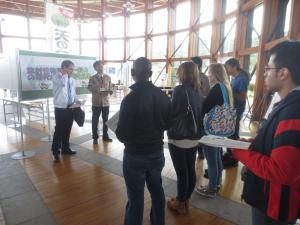On the weekend of the 19th and 20th of October, a number of JETs took part in a ‘study tour’ to Aizu and Kitakata. The purpose of the tour was to have the chance to see some of Fukushima’s famous sights, but more importantly to see how the prefecture has been recovering since the March 11th 2011 disaster. The participants had the opportunity to experience a wide-range of Fukushima-related activities, such as painting ‘okiagarikoboshi’ dolls, visiting Aizu ‘Tsuruga’ Castle, a sake brewery, and some of Kitakata’s famous traditional storehouses, as well as staying overnight at a local farm and helping with farming work. We were also able to visit the Fukushima Agricultural Technology Centre and a local JA centre dedicated to screening Fukushima rice for harmful radiation. One of the most interesting and informative parts of the trip for me was the visit to the Agricultural Technology Centre. After picking all the participants up in either Fukushima or Koriyama, we headed to the Centre which tests Fukushima produce (vegetables, meat and dairy products) for radiation levels. We watched a presentation about how the produce is screened and tested before being given a tour of the facility and seeing the rooms where the testing is carried out. Before leaving the centre, we enjoyed a delicious meal of yakiniku and fresh vegetables. I found this part of the trip to be the most informative, as although I was already aware that Fukushima produce is closely scrutinised and monitored for harmful radiation, it was interesting to hear about and see the process for myself. A major highlight of the trip was the ‘farm stay’. We were separated into small groups of 3 or 4 before meeting our host mother/father. On Saturday night, each group relaxed and enjoyed eating and drinking with their host family and on the Sunday we prepared to try our hands at some farm work. Unfortunately, heavy rain prevented us from doing work outside, so instead we experienced removing seeds from raw cotton using a special wooden press. Despite the poor weather we had fun, and it afforded us another chance to interact and chat with the host family. This trip was a fantastic experience and is something that I would recommend to all Fukushima JET participants regardless of the amount of time already spent in here! Not only was it very informative and interesting, but it was also a heartening experience seeing how the prefecture is recovering from the effects of the March 11th disaster. Despite the hardships faced, the people of Fukushima are resilient and have never given up, and from the looks of things, Fukushima will become even stronger! I’m looking forward to the next study tour to Iwaki! |  |
| Summary |







